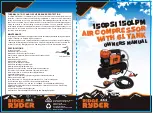
to Fig.6 OPEN). To close the valve, rotate the
air tap so it is facing to the right or the left side
of the air valve (refer to the CLOSED picture).
4. Start the compressor by following the pro-
cedure in the section “To start and stop the
compressor”.
For the first time of operation, run the com-
pressor for 10 minutes with no load and with
the outlet valve open to ensure all parts are
well lubricated.
WARNING: Be aware that pressurised air will
be discharged from the outlet and care should
be taken that this discharge is not directed
towards you the operator, or other persons
within the area.
TO START & STOP THE COMPRESSOR
1. Check the rating label on the
compressor indicates 120V.
2. Plug in the mains cable of
the compressor to a stand-
ard 120 V household power
point and turn on.
3. To start the compressor,
lift the ON/OFF switch on the
pressure switch cover (Fig.8).
4. To stop the compressor,
push the ON/OFF switch
down (Fig. 9).
OPERATION
1. The pressure in the tank is controlled by the
action of the pressure switch located under
the pressure switch cover. When the set maxi-
mum pressure is reached the pressure switch
activates and the motor is switched off.
The pressure then decreases as the air is used
by the connected tool until the set minimum
pressure is reached after which the pressure
switch causes the motor to switch on again.
The operator of the compressor should be well
aware that during use of the compressor the
motor will start and stop under the influence
of the rising or falling pressure in the tank. The
motor will start without any warning.
2. The maximum and minimum pressures are
factory set and the operator should not try to
change them.
3. The outlet on the com-
pressor can be regulated.
4. The pressure of the air
outlet can be changed, by
turning the regulating knob
(Fig.10). Rotate the knob clockwise to increase
pressure and anti-clockwise to decrease pres-
sure.
NOTE: To obtain the correct output reading
on the regulated output gauge, the air must
be flowing through the outlet. The regulating
valve should be adjusted and the gauge read
with the outlet valve open and the air being
discharged from the regulated outlet through
the accessory being used. To increase the air
pressure, rotate the regulating valve clockwise.
To decrease the pressure, rotate the regulating
valve anti-clockwise.
NOTE: If you do not allow the air to discharge
while you are setting the regulator, the pres-
sure as indicated on the regulated outlet
gauge will be incorrect. This gauge ONLY in-
dicates the correct pressure while air is being
discharged from the outlet.
5. On completion of the task, i.e. when you
have finished using the compressor, or when
you are leaving the compressor unattended,
turn off the compressor in the following way:
• Press down the on/off switch.
• Wait for the pressurised air to bleed from the
release valve under the pressure switch cover.
NOTE: When you press the button down you
should hear a short air discharge (Approx. 1/2
second).
• Switch off the electrical power supply and re-
move the electrical plug.
• Pull the ring (Fig.11) on the
safety valve to ensure all the
pressurised air is released
from the tank, or open the
drain cock to release the
pressure from the tank.
ADDITIONAL WARNINGS
1. Never attempt to remove any part of the
compressor whilst the tank is under pressure.
2. Never attempt to remove any electrical com-
ponent whilst the compressor is connected to
the power supply. Switch off the power and
remove the electrical plug.
3. Do not adjust the safety valve.
4. Do not use an electrical extension cable.
5. If the release valve under the pressure switch
cover fails to operate when the on/off button
is pressed down, switch the power supply off
and determine the nature of the fault.
ON
Fig.8
OFF
Fig.9
Fig.10
Fig.11
14
COMP6100A manual.indd 14
23/06/15 14:31


































